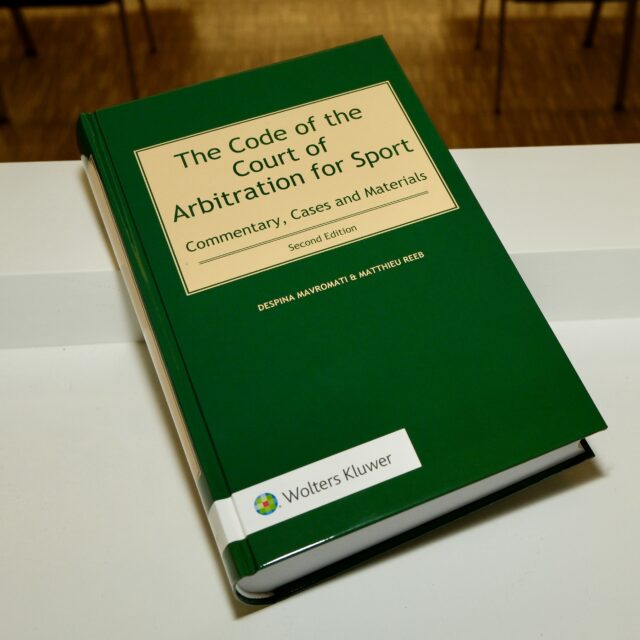The Issue
Does the Termination Order for non-timely payment of the CAS advance of costs under Article R64 CAS Code constitute “excessive formalism” and therefore a violation of the procedural public policy under Article 190 (2) (e) Swiss PILA?
The Facts
On August 11, 2016, the World Anti-Doping Agency (WADA) filed a statement of appeal to the CAS against an agreement, entitled “Acceptance of Sanction”, between US gymnast X (the Athlete) and the United States Anti-Doping Agency (USADA) (jointly referred to as the Respondents). After paying the Court Office Fee according to Art. R48 and R64.1 of the CAS Code, the arbitration procedure started with CAS reference 2016 / A / 4743 WADA v. X & USADA. However, after the Respondents denied to pay their share of the advance of costs (CHF 18’000), CAS invited WADA to pay both parties’ shares under the pertinent provisions of Art. R64 CAS Code.
Under this provision and Art. R48 CAS Code, the parties were reminded that the advance of costs must be paid within a certain deadline, failing which the appeal would be considered to be withdrawn and the proceedings would be terminated. After WADA paid it’s half of the fees (i.e., CHF 18’000 of the total CHF 36’000), and following an exchange of correspondence in which WADA’s Counsel brought forward a clerical mistake for the non-payment of the full amount, the CAS Court Office terminated the proceedings. The procedure was officially terminated through a termination order by the CAS Appeals Division President.
WADA subsequently filed an appeal to the Swiss Federal Tribunal alleging a violation of its right to be heard for « excessive formalism » (Art. 190 (2) (d) PILA) and violation of public policy (Art. 190 (2) (e) PILA.
The Federal Tribunal judgment
a) Admissibility of an Appeal against a CAS Procedural Order
The Federal Tribunal reiterated that the appeal is admissible against an award (final, partial, preliminary or interlocutory) (at 2.3). A simple procedural order is in principle not subject to appeal to the extent that it can be modified in the course of the proceedings (4A_600 / 2008 of 20 February 2009, at 2.3). The same applies to an order on provisional measures under Art. 183 PILA (ATF 136 III 200 at 2.3). However, and since the name given to a contested act is not decisive (ATF 142 III 284 recital 1.1.1), a Termination Order would necessarily put an end to the arbitration and qualifies as an award appealable to the Federal Tribunal. Indeed, by failing to pay the advance of costs, Art. R64.2 of the CAS Code applies and the unavoidable consequence is the “withdrawal” of the appeal. Under these circumstances, the appeal was found to be admissible.
b) Violation of the Appellant’s Right to be Heard
The Appellant (WADA) principally invoked a violation of its right to be heard before the CAS proceedings because the CAS failed to examine an essential argument raised by it, namely, whether strict application of the relevant provision was justified in light of the circumstances of the case. Under Art. R64.2 CAS Code, in the event of nonpayment of the full advance of costs within the time limit set by the CAS, the appeal is deemed to be withdrawn and the CAS terminates the arbitration. The Federal Tribunal held that the interpretation and application of this provision by the CAS Division President fell outside the scope of the Federal Tribunal’s review and an incorrect or even arbitrary application of an arbitration rule would not amount to violation of public policy (ATF 126 III 249, at 3b) (4A_692/2016, at 5.2).
c) Violation of Procedural Public Policy – Excessive Formalism
The Federal Tribunal equally dismissed the allegation of excessive formalism of the CAS Division President (at 6). Excessive formalism falls within the violation of (procedural) public policy of Art. 190 (2) (e) PILA and has been examined by the Federal Tribunal on various occasions (4A_690 / 2016 of 9 February 2017 at 4.2; 4A_600 / 2008 of 20 February 2009, at 5). Under Swiss jurisprudence, excessive formalism is a particular aspect of the denial of justice prohibited by Art. 29 (1) Cst. (ATF 142 I 10, at 2.4.2). Formalism is considered to be excessive when the strict application of the rules is not justified by an interest worthy of protection and unsustainably complicates the realization of substantive law or restricts access to courts (at 6.2) (ATF 130 V 177, 5.4.1, p.183, 128 II 139, at 2a, pp. 142, 127 I 31).
The jurisprudence of the Federal Tribunal has shown that the termination of the proceedings for failure to pay an advance of costs does not constitute excessive formalism nor a denial of justice, provided that the parties have been notified of the amount to be paid, the time limit for payment and the consequences of the non-observance of that time-limit (ATF 133 V 402 at 3.3 pp. 405, 104 Ia 105 at 5 pp. 112, 96 I 521 4 pp. 523).
By citing examples from the Swiss jurisprudence, the Federal Tribunal showed that inadmissibility for non- payment of the advance of costs does not lead to excessive formalism even in case of an almost complete partial payment (93%) of the required advance of costs (2D_45 / 2012 of 10 September 2012 at 5.2). There have been similar cases before the CAS (also related to the procedural defect of sending the statement of appeal by fax, 4A_690/2016 at 4.2). The non-payment of the advance of costs in a CAS procedure was also brought before the CAS some years ago and the Federal Tribunal reached the same conclusion (4A_600/2008, at 5.2.2) (4A_692/2016, at 6.2).

The Takeaway
In these proceedings, the Appellant (WADA) unsuccessfully argued that its case was distinguishable from the prior cases where similar situations have been dealt with by teh Swiss Federal Tribunal. The latter reiterated its definition of excessive formalism and brought together numerous examples from cantonal and federal case law in order to conclude and confirm – once again – that termination of the CAS proceedings due to the not timely payment of the advance of costs does not amount to excessive formalism. This is true particularly if a) the amount and the payment deadline were clearly stated at the outset of the procedure and b) the consequences of the non-payment were also clear.
Other factors that weigh against the person / entity alleging excessive formalism in these cases include a) the previous experience /status of the person/ entity (in the present case, WADA, the widely known body regulating doping at world level, had brought numerous similar cases before CAS and was therefore familiar with the payment conditions) and b) the fact that such person / entity benefits from professional legal advice (at 4A_692/2016, at 6.3).







